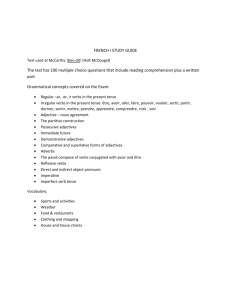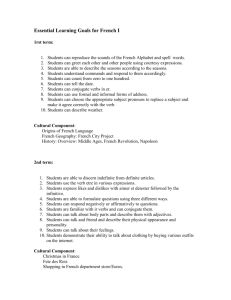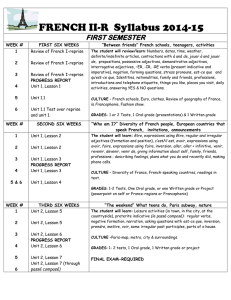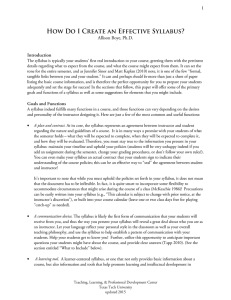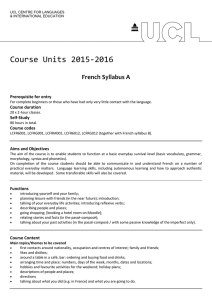SSCs 2015-2016 French Syllabus A Prerequisite for entry Course duration
advertisement
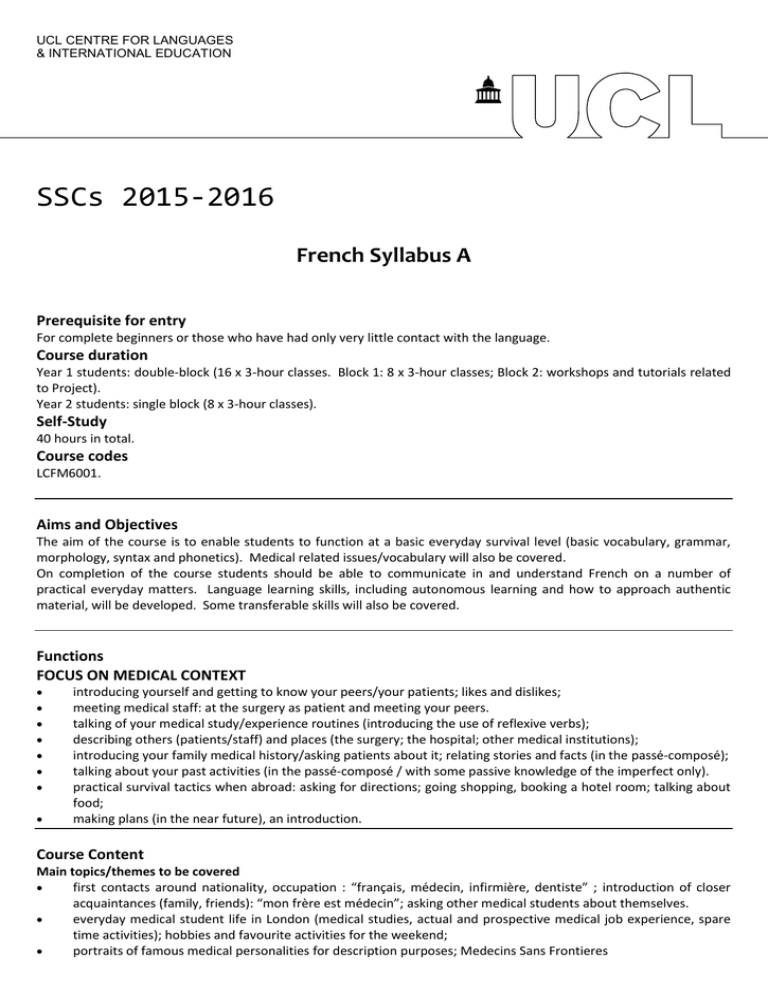
UCL CENTRE FOR LANGUAGES & INTERNATIONAL EDUCATION SSCs 2015-2016 French Syllabus A Prerequisite for entry For complete beginners or those who have had only very little contact with the language. Course duration Year 1 students: double-block (16 x 3-hour classes. Block 1: 8 x 3-hour classes; Block 2: workshops and tutorials related to Project). Year 2 students: single block (8 x 3-hour classes). Self-Study 40 hours in total. Course codes LCFM6001. Aims and Objectives The aim of the course is to enable students to function at a basic everyday survival level (basic vocabulary, grammar, morphology, syntax and phonetics). Medical related issues/vocabulary will also be covered. On completion of the course students should be able to communicate in and understand French on a number of practical everyday matters. Language learning skills, including autonomous learning and how to approach authentic material, will be developed. Some transferable skills will also be covered. Functions FOCUS ON MEDICAL CONTEXT introducing yourself and getting to know your peers/your patients; likes and dislikes; meeting medical staff: at the surgery as patient and meeting your peers. talking of your medical study/experience routines (introducing the use of reflexive verbs); describing others (patients/staff) and places (the surgery; the hospital; other medical institutions); introducing your family medical history/asking patients about it; relating stories and facts (in the passé-composé); talking about your past activities (in the passé-composé / with some passive knowledge of the imperfect only). practical survival tactics when abroad: asking for directions; going shopping, booking a hotel room; talking about food; making plans (in the near future), an introduction. Course Content Main topics/themes to be covered first contacts around nationality, occupation : “français, médecin, infirmière, dentiste” ; introduction of closer acquaintances (family, friends): “mon frère est médecin”; asking other medical students about themselves. everyday medical student life in London (medical studies, actual and prospective medical job experience, spare time activities); hobbies and favourite activities for the weekend; portraits of famous medical personalities for description purposes; Medecins Sans Frontieres talking about health : “ Je suis malade. J’ai mal à…”; open question to identify the patient’s problems : “ qu’est-ce que vous avez?”; descriptions of people, body parts: “ Il est grand, elle est grande.”; “Les doigts, la tête, …”; places in town and shops: ”l’hôpital, la clinique, le CHU, la pharmacie”; past experiences as medical student; patients’ medical history planning to study or work abroad as a medical student; volunteering abroad. Skills medical lexicon as patient and as doctor/medical student; preparing for a short patient consultation ; diagnosis and descriptions of people, body parts. describing your medical environment; talking about the past; making plans in the near future, an introduction. Reading reading for gist and scanning for specific descriptive information; reading basic narrations; short medically related articles. Writing personal presentation; portrait of themselves and others / people and places; telling stories; practising different formats: medical brochure, interview, presenting a medical project, celebrating medical personalities and contributions. Linguistic Structures Phonetics basic rules of the pronunciation of spoken French. Grammar gender and number of French nouns: the corresponding use of definite and indefinite articles; present tense of regular verbs in -er and of the verbs “être” and “avoir”; basic interrogative and negative structures; present tense and the structure of the irregular verbs (aller, faire, venir, prendre, vouloir, pouvoir, devoir) when followed by another infinitive verb: when to use “de” between two verbs; introduction of the near future based on aller + infinitive; adverbs and prepositions referring to place (aller à ) and activity (faire de); ‘‘de’’ as a partitive article (de la, du, des) and the negation of the partitive indefinite article (pas de + no indefinite article + noun); passive knowledge of direct pronouns (le, la, les before verbs without prepositions e.g. je le vois) and indirect pronouns; basic knowledge of imperative mode; demonstrative articles (ce, cette, cet, ces) and possessive adjectives (mon, ma, mes…); pronominal and reflexive verbs (se verbs); agreement in gender and number of the adjectives in descriptions; past tenses: the active use of the passé-composé and the passive knowledge of the imperfect for “être” and “avoir”. Learning Resources Le Nouveau Taxi 1, textbook. Guy Chapelle, Robert Menand (Hachette) - ISBN 9782011555489 Santé-médecine.com CLE INTERNATIONAL (2004); www.cle-inter.com for medical vocabulary: to check with tutor if this is for reference only or to be purchased. Bilingual Dictionary – Pocket Edition (Collins/Robert) A selection of authentic material will also be used. In addition there is a wide range of language learning materials available for self-study in the Self-Access Centre.
